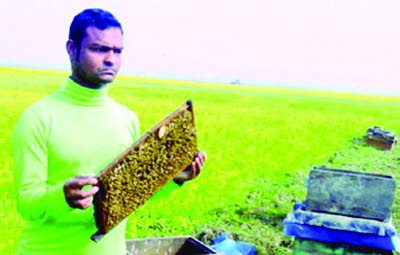
Honey farming has gained popularity in the region including its vast Barind tract as many people attained success through commercial harvesting of honey.
Honey farming is being expanded gradually at many new areas contributing a lot towards employment generation besides boosting honey production.
Ataur Rahman, a farmer of Namajgram village under Godagari Upazila, remained involved in honey harvesting in mustard field since 2000. In the initial stage, he gained profit through setting up ten boxes that encourages him to enhance the number of boxes in the following years.
In this season, he has set up 250 boxes in different areas. “I have harvested 15 kilograms of honey from every box in last 12 days”, Ataur Rahman said. He earns more than Taka seven lakh every winter season through his commercial honey harvesting.
“Honey harvesting makes me income-generator and self-confident,” said Ashraful Islam Sumon, another farmer of Hasnabad village under Godagari Upazila, adding that he has collected 12 kilograms of honey from every box in last 11 days.
“I got 35 mounds of honey from my 63 bee-colonies in Borobilla area under Paba upazila. I sold twelve mounds to locals. Now I am waiting to sell the rest to a company at a good price,” said Habibur Rahman Babu, a farmer in Darusha village under the same upazila.
Mustafizur Rahman, Additional Director of Department of Agriculture Extension (DAE), said more than 260 tonnes of honey were produced in the region during the current season making growers hopeful of getting a good earning.
He said this amount is five times higher than that of last year. Farmers of Rajshahi, Naogaon, Natore, Chapainawabganj and other adjacent districts had been engaged in honey extraction since mid-November.
Farmers set up 7,500 bee-colonies near mustard fields in different villages there was good flowering, and got around 80 kg of honey from each colony in two weeks, the growers said.
The farmers said they were able to sell one-third of the honey to local people and wholesalers at around Tk 150 per kilogram, and are waiting for business companies to buy the rest.
“We will be able to make a good profit if the companies buy our honey for Taka 150 to Taka 200 per kg,” the growers said.
A number of growers said the same, adding that they have to spend about 50 percent of the earning to meet the cost during extraction and for feeding the bees during the off-season.
Department of Zoology in Rajshahi University Prof Dr Bidhan Chandra Das told BSS that honey farmers need technological support, financial assistance and a sound of marketing system.
“It’s possible to make the honey farming a million-dollar business for the country, creating huge jobs,” he said.
“If the government takes proper steps, honey production will get a boost in the country, ushering in a new opportunity for export,” said Dr Das.
32,340-kg honey
collected in Jamalpur
BSS from Jamalpur adds: A total of 32,340-kg honey was collected from mustard field in the district this year.
Department of Agriculture Extension (DAE) officials here today said honey collectors set up 5,060 boxes in mustard field for collecting honey in the district during the current Robi season. They collected 32,340 kilograms of honey worth about TK 1.30 crore.
They said mustard was cultivated on 17,700 hectares of land in the district this year but the honey was collected only from 3992 hectares of mustard field.
They added most of the honey was collected in Islampur upazila of the district. In the upazila, honey collectors got 25,000-kg honey by setting up 3120 boxes on 2300 hectares of land. On the other hand, 300-kg honey was collected in Jamalpur sadar upazila while 1480-kg in Sarishabari, 400-kg in Melandaha, 2160-Kg in Dewanganj, 1000-kg in Madarganj and 2000-kg in Bakshiganj upazila.
According to DAE office sources, during honey collection bees help pollinate the flowers, increasing mustard production 15 to 25 per cent. Last year 31960-kg honey was collected from the mustard field here.

